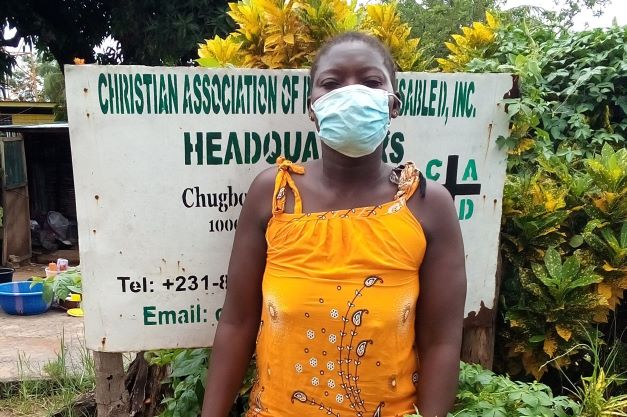PHOTO: Madam Sandra Flomo, CAPD Director
By Tina Mehnpaine, Internews PwD Fellow
For people living with disabilities (PWDs), getting skills training is an uphill task in Liberia, but a group of physically challenged persons have recently been empowered with new skills.
It was against this background that about ten PWDs were recently trained in the skills of soap making, tidying and community mobilization. Many of the latest beneficiaries say they had always wanted to acquire such skills training in the past, but due to lack of funding, they have not had such opportunity.
Madam Sandra Flomo, Executive Director of Christian Association of the Physically Disabled made the disclosure in an exclusive interview with the Internews PwD Fellow in Monrovia.
“With timely funding secured from the National Commission on Disability (NCD), partners, and donors after six months, these PWDs were empowered so that they would not go into the streets to beg,” Madam Flomo asserted.
Director Flomo regretted that although the total number of ten PWDs beneficiaries was not satisfactory, she expressed the hope that efforts will be made for more empowerment programs for the PWDs community in the near future.
“Sometimes the commission gives us subsidies, sometimes we write donors, sometimes we write partners, sometimes, we write proposals,” Madam Flomo intimated.
She said her group was interested in building the capacities of PWDs and promoting their wellbeing.
According to Madam Flomo, all funds generated during the graduation ceremony were given to the graduates to use as a start-up and to purchase some of their materials.
“The little funding we raised on their graduation, we were able to purchase their materials for them,” said the Director of the Christian Association of Physically Disabled.
This organization was founded by Director Sandra Flomo’s late husband, Richard K. Flomo who died in 2019 as a result of an illness.
Even though Article 27 of the 2005 Act that established the NCD speaks about the empowerment and the rights of persons living with disabilities to work, not much has been done by past and present governments to ensure that this Act is functional.
Only small funding has been allocated for the Commission that is cloth with the responsibility to carry out trainings for PWDs and to ensure that their rights are respected, which violates the 2005 Act; which states that for every 100 persons employed in a public institution four percent of that number must be PWDs employees that should be based on merit.
The ILO Convention of 1986 also recognizes the economic benefits and the other huge benefits that come back to the country, when persons with disabilities are trusted with public and private offices.
The law calls for PwDs to be included in the workforce and given empowerment skills. But community-based organizations set up to promote the interest of the disabilities community lack the needed support.
The Christian Association of the Physically Disabled Director pointed out that the recently concluded six months of training for the PwDs could have come at a better time, in the wake of the global Coronavirus pandemic when they are finding it difficult to even get daily meals.
According to Madam Flomo, those trained PWDs will also be able to teach others who are physically disabled in their respective communities.
Owing to lack of funding, she added that the leadership of her organization are pleading with them to be mentor to their fellow PwDs.
The goal of her organization is to advocate for the rights of the physically challenged to employment in public and private offices.
The 2008 population census says people living with disabilities make up fourteen percent of the Liberian population. But it has now been 13 years since the last census was conducted in this country. And more people have since that time joined the list of people living with disabilities.
“We make up twenty two percent of Liberia’s current population as sadly when strokes catch one PWDs, such victim will automatically become disabled and there are different kinds of disabilities,” Director Flomo said.
“Disability is not Liability”
Madam Flomo is not only involved in advocacy, she also maintains her little table market in front of her house that she uses to sustain her family.
Emphasizing that “disability is not inability”, she said as a widow with four children, she has to engage in her community business that is now sustaining her children; rather than going in the street to beg for help or appearing sorrowful in the neighbourhoods.
Since the death of her husband in 2019, she explained that she has managed to sustain her children from the proceeds of her petty business without asking for external help.
“I am a widow with four children and my husband died in 2019 and since then, it has not been easy but, through my little business my children and I are surviving,” Madam Flomo said.
In her stock of goods are basic provisions including food items, which she supplies to some residents in Chougbor, Old Road community, a suburb of Monrovia.
Madam Flomo travels from Old Road, Chougbor to the Red-Market market to buy her goods in bulk and wholesale and sell retail.
On a daily basis, she makes $LD 2, 000 or $LD2, 500 and during the weekend, her sales shoots up.
It is from the profit realized from her small business that she pays her children’s school feess, medical bills, and feeding as well.
A car accident in the 1990 led to her physical disability in her young age, when her two legs were damaged. This Report was made possible with support from Internews Liberia Inclusive Media Project.

